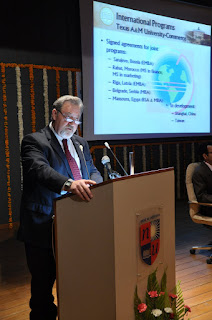Mr. Pavan Duggal spoke about the wide gamut of Indian Cyber cases and the new corporate security mechanisms. .”We don’t think of Cyber Law as a proactive plan” said Mr Duggal. He threw light on the crises faced in India due to absence of cyber laws and the factors that lead to
 India becoming the 12th nation in the world to enforce cyber law. He elaborated on the intricacies of the law and the subsequent amendments to the law that now covers all kinds of communication devices , such as mobile phone, smart phones and PDAs, that can transmit audio and video information. He further commented “There is no law for right to privacy”. Prof. Liliana Moga gave a critical analysis of cyber laws in Romania which is still in the nascent stage and the directions where there is scope for enhancements to cover the lacunae.
India becoming the 12th nation in the world to enforce cyber law. He elaborated on the intricacies of the law and the subsequent amendments to the law that now covers all kinds of communication devices , such as mobile phone, smart phones and PDAs, that can transmit audio and video information. He further commented “There is no law for right to privacy”. Prof. Liliana Moga gave a critical analysis of cyber laws in Romania which is still in the nascent stage and the directions where there is scope for enhancements to cover the lacunae.The Chief Guest for the valedictory session was Prof. Manas Chatterjee from University of New York, USA. From his vast teaching experience he expressed his opinion about the state of management education in India, “Management education in India is not going the right way, there should be emphasis to bring ‘indianness’ in the curriculum as management style that works in the developed nations will not work in the developing nations”, he said. This was followed by a talk by Mr. Larry Lemanski, Texas A&M University, USA who spoke on the importance of managing internal conflicts and maintaining global peace in times of turbulence.
Overall out of the 227 abstracts and 160 full papers received, around 100 papers, of which around 10 from foreign delegates, were shortlisted and presented in 24 concurrent sessions across three days of NICOM. NICOM saw the participation of the brightest minds from the industry and academia who came together and brainstormed about how best to lead an organization through turbulent times and addressed a wide gamut of challenges faced by businesses globally during recessionary business environment were addressed.

